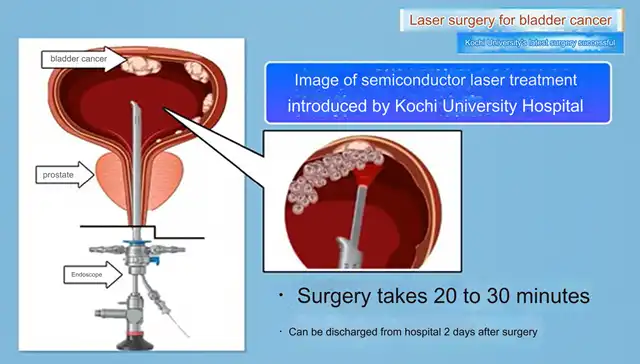Kochi University pioneers outpatient bladder cancer treatment using semiconductor lasers
- Normal Liver Cells Found to Promote Cancer Metastasis to the Liver
- Nearly 80% Complete Remission: Breakthrough in ADC Anti-Tumor Treatment
- Vaccination Against Common Diseases May Prevent Dementia!
- New Alzheimer’s Disease (AD) Diagnosis and Staging Criteria
- Breakthrough in Alzheimer’s Disease: New Nasal Spray Halts Cognitive Decline by Targeting Toxic Protein
- Can the Tap Water at the Paris Olympics be Drunk Directly?
Kochi University pioneers outpatient bladder cancer treatment using semiconductor lasers
- Should China be held legally responsible for the US’s $18 trillion COVID losses?
- CT Radiation Exposure Linked to Blood Cancer in Children and Adolescents
- FDA has mandated a top-level black box warning for all marketed CAR-T therapies
- Can people with high blood pressure eat peanuts?
- What is the difference between dopamine and dobutamine?
- How long can the patient live after heart stent surgery?
Kochi University pioneers outpatient bladder cancer treatment using semiconductor lasers
Kochi University has successfully conducted the first treatment for bladder cancer using semiconductor lasers in Japan. There is a possibility that surgery can be performed on an outpatient basis in the future.

Kawabe Serina, Anchor:
“It seems that a treatment that ‘evaporates cancer’ is being performed at Kochi University. What kind of treatment is it? Let’s go and find out.”
In February 2024, Kochi University School of Medicine Hospital in Okatoyo-cho, Nangoku City, successfully performed the latest surgery in Japan to irradiate bladder cancer with semiconductor lasers. Associate Professor Hideo Fukuhara of the Urology Department performed surgery on four patients from February 2024.
Bladder cancer is a disease that causes symptoms such as bloody urine and pain during urination, and is said to be common in smokers and men over 60 years old. Until now, the standard treatment was to use an endoscope to remove the cancer with an electric scalpel, but there was a risk of surrounding tissue damage, bleeding, or perforation of the bladder.
On the other hand, the latest technology uses lasers to burn and eliminate cancer cells instead of an electric scalpel, a process known as “vaporization.” At the same time, the wound is sealed by the laser, eliminating the need for hemostasis. The surgery is about 20 to 30 minutes shorter than conventional methods, lasting around 20 to 30 minutes. Previously, patients required hospitalization for 3 to 5 days after surgery, but they can now be discharged in 2 days due to the elimination of the need for hemostasis.
According to Associate Professor Fukuhara, bladder cancer recurs in 2 out of 3 patients, but with the latest technology, the risk of recurrence can be reduced by 8%.
Associate Professor Hideo Fukuhara, Department of Urology, Kochi University School of Medicine:
“We hope to provide medical care in a way that reduces the burden and anxiety for patients by undergoing laser treatment.”
Laser treatment is only available to people with early bladder cancer that has “recurred,” as recognized by European guidelines.
Currently, general anesthesia is used for safety, but Associate Professor Fukuhara aims to make outpatient surgery without anesthesia possible from the fiscal year 2025 onwards, following examples from overseas.
According to Associate Professor Fukuhara, the treatment using semiconductor lasers can also be applied to the stomach and lungs, so there is a possibility that it will be used for the treatment of other organs in the future.
Kochi University pioneers outpatient bladder cancer treatment using semiconductor lasers
(source:internet, reference only)
Disclaimer of medicaltrend.org
Important Note: The information provided is for informational purposes only and should not be considered as medical advice.



